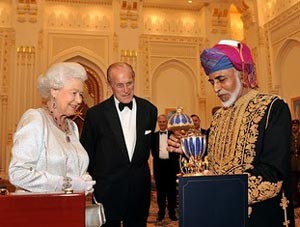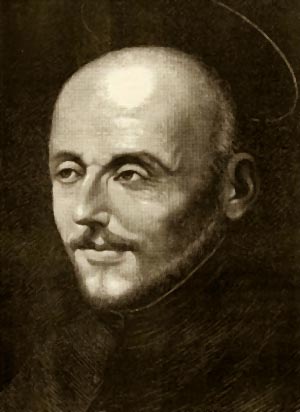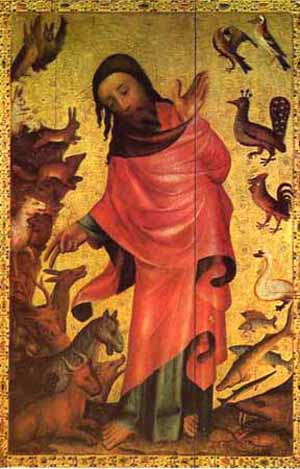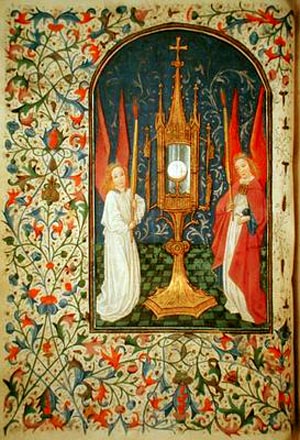 |
Special Devotions
Comments on a Meditation of St. Ignatius - I
The Magnitude of the Gift of the Holy Eucharist
Plinio Corrêa de Oliveira
St. Ignatius divides this meditation into three points: “Consider that three things can come together to make a gift greatly esteemed: the grandeur of the gift itself, the affection of the one who gives it, and its usefulness for the recipient. These three things are found in a marvelous way in the Holy Eucharist.”
I would like you to note how logical this reasoning is. St. Ignatius wants to consider the Blessed Sacrament as a gift, a present. Based on this, he presents an explanation of the value of a gift, an explanation valid for all gifts in all places and times. And he gives the three points that make a present appreciated:

Queen Elizabeth receives the gift of a precious vase from the Sultan of Oman |
- The grandeur of the gift itself;
- The affection of who gives;
- The usefulness for the recipient.
The order is perfect. He reduces the action, a gift that one person gives to another, to its most simple expression. Therefore, to analyze the value of a gift, one should analyze the thing itself, the one who gives it, and the recipient. With this, the gift is analyzed. I believe this statement reveals the clarity of the mind that made it. St. Ignatius goes to the very root of the matter, letting nothing escape.
A very different order of values is applied in our days. Today, most individuals receive the present in an almost irrational way. “It’s nice,” one might say, but he would not know how to analyze it, how to tell its value, to explain why he liked it. He would offer a tangle of confused impressions, not well separated and analyzed considerations, contrary to the Ignatian spirit and to the Catholic spirit in general. The person with a Catholic spirit analyzes his feelings to verify what is good and bad in them. This is the true Catholic spirit.
Once St. Ignatius of Loyola said that, at any given moment, he could write down 16 reasons – pro and con – why he had greeted a novice of the Company in the certain way he did when the latter passed by him. That is to say, everything in him was so well considered, so well calculated, that he could explain his thinking in writing at any time. If I were to ask two of you young men, for example, who just greeted each other, to stop and explain why you did it in that particular way, I believe you would have difficulty finding an answer.
This is not so much a reproach of you as of the teachers who formed your generation. But here, we are penetrating into the firmament of the Ignatian spirit, and we can see how this sky is ordered, how everything is taken into account, weighed and measured. Scriptures say that the works of God are like this: Everything is taken into account, weighed and measured. And so we can see how the mind of St. Ignatius weighed and measured everything.
True hierarchy
The first thing, then, that the recipient considers is the value of gift (today one would consider its utility first). Second, he considers the one who gave it; and third, its usefulness for him. This is the true hierarchy.
If someone gave me a diamond in a beautiful box, for example, the first thing to take into account is its value. The second thing to consider is the one who gave it. Let us say it was the Queen of England. For some reason the Queen of England sent me a present and orders a small card placed in the box, “A diamond sent by the Queen of England.” The third question regards the utility of that gift, “What will I do with the diamond?" How is it useful to me?
Everything in the process is well thought out, reasonable, splendid! This is how I wish each one of us would be. It is an invitation, a horizon that opens.
God in the Eucharist gives Himself to man
St. Ignatius continues: “First, consider the magnitude of the gift. Our Lord had already given great things to men: He gave us our lives, along with countless creatures for our benefit and conservation. Although these things were very valuable, they were finite.

St. Ignatius, a master in analysis and reason |
"In the Incarnation God gave men an infinite gift; the perfect humanity of Jesus Christ was given to all of us through Him. With this gift, Our Lord could still give Himself to each one of the faithful in particular, extending in this way the benefit of the Incarnation.”
St. Ignatius makes this consideration: God gave a portion of things for men. The first gift He gave us was our being, because there was no use giving the rest if we did not exist. Therefore, the first gift he gave us was our being – He created us.
In addition, He created all the heaven and earth for men. Take the sky, for example, even it no one else existed, it would shine as it does only for me. So I must thank God for it as if it were made just for me. God gave the sky, the earth, everything that exists, health, intelligence – all these things - for each man.
In His earthly life, He gave the Incarnation of the Word. He became flesh to save us. Our Lord Jesus Christ, the Second Person of the Trinity, condescended to become man to save us – an enormous gift. Imagine a person who made a space trip to go to another planet to get something for someone, for example, a special type of eye implant for his friend who had lost his sight. We would consider that extraordinarily generous. If someone did this for an individual, that recipient would thank the giver for his whole life and sing his praises for such generosity.
Now, the Second Person of the Trinity has traversed a space much greater than planetary to come to us. He is the true God; nonetheless, He lowered Himself, He condescended to become Man, the least of the rational creatures.

Creation, a gift of God to each man |
God gave man such a great gift by becoming Man that St. Louis, the King of France, introduced the custom in the Church to genuflect during the Credo when the words et homo factus est were said. This is because this gift of God becoming man is so extraordinary that everyone should genuflect to thank God for it.
Furthermore, after becoming Man, He spent 30 years in private life with Our Lady to give glory to God and to pray for men. He prayed during all this time for the mission that He would fulfill. For three years he performed such wonders that St. John says that if someone were to record the deeds He performed during these three years, there would be so many books that they would fill the Earth. The Gospels tell us only a part of these deeds. They are so marvelous that they are beyond all praise.
After giving us all these teachings, after giving us His miracles and His example – all the patience, goodness and pardon He showed – He did one more thing: He instituted the Holy Eucharist as the crown of His gifts to man. He gave us the Blessed Sacrament. With this, in a certain way He gave us something more than when He became Man. He made it possible for us to have a more intimate union with Him through the Holy Eucharist than the one we would have with Him as Man-God.
The Holy Eucharist is a consequence: It is a fruit of the Incarnation, but it perpetuates the Incarnation among men, so to speak. You understand, then, how prodigious a gift the Holy Eucharist is.
Originality of the Eucharistic gift
St. Ignatius continues: “This, then, is what He did in the Eucharist, communicating His richness and goods: His Body, Blood, merits, virtues, soul and divinity with an invention so admirable that the Seraphim could never imagine it even if they were to think for all eternity. Therefore, in this life one cannot ask for anything better, anything greater from Our Savior.”

The Holy Eucharist, fruit of the Incarnation |
The thinking of St. Ignatius is admirable. He says: Our Lord in the Eucharist gives us Himself, but He gives Himself in a way no one could have imagined. It is a way so admirable that the highest choir of Angels, the Seraphim, even if they would have thought for all eternity could not have come up with the idea of God giving Himself to man under the species of bread and wine. In a way that He enters man and is assimilated by him. One could not imagine so intimate a union.
On earth, for example, persons have relationships with each other, but none is as intimate as that between Our Lord Jesus Christ in the Eucharist and us. Who of us is worthy of these gifts? Our Lord comes with His Body and His Blood, with His merits.
What are the merits of Our Lord Jesus Christ? They are merits so great that a single drop of His Blood could have redeemed the entire world. However, He chose to shed all of His Blood on the Cross. The merit of His Blood is infinite! And then, all of His Precious Blood shed for us comes into us in the Eucharist.
All of His virtues come into us. That is to say, He comes with all His holiness into us. Therefore, He touches us with His holiness and familiarly influences us with His sanctity. Now, the sanctity of Our Lord Jesus Christ is infinite. It is difficult to even have an idea of what it is. The sanctity of Our Lady is immeasurable, but the sanctity of Our Lord Jesus Christ is far beyond this: It is infinite!
Although Our Lady’s holiness is immeasurable, it has an end because she is a finite creature. But Our Lord’s holiness is infinite, He is Holiness itself. It is He who condescends, then, to come to each of us in the Holy Eucharist.
You can see how magnificent this gift is: He, locked in the Tabernacle until the hour when He comes to visit each one of us, visits us more intimately than when He went to the house of Lazarus and Mary Magdalene while He lived on this Earth. Because He did not enter into Lazarus and Mary Magdalene as He enters into us in Holy Communion. Therefore, it is a truly priceless gift. All the riches of the earth – intelligence, glory, fame, health – none can compare to one Communion.
Some of us have had the enormous grace of receiving Communion every day for many years. We should be grateful for so many gifts accumulated through those years. It is a truly unimaginable treasure.
This is the amplitude of the gift God gives us in the Holy Eucharist.
Continued

Taken from the personal records of Atila S. Guimarães,
Summarized and translated for TIA’s site
Posted July 13, 2011

Related Topics of Interest
 St. Clare and the Saracens St. Clare and the Saracens
 Bread of the Strong Bread of the Strong
 Muslim-Style Adoration for Catholic Children Muslim-Style Adoration for Catholic Children
 Benedict XVI Gives Communion in the Hand Benedict XVI Gives Communion in the Hand
 Bill Clinton Receives Holy Communion Bill Clinton Receives Holy Communion
 The Five Sins Against Our Lady The Five Sins Against Our Lady
 Archbishop Niederauer Gives Communion to Homosexuals Archbishop Niederauer Gives Communion to Homosexuals

Related Works of Interest
|
|
Special Devotions | Religious | Home | Books | CDs | Search | Contact Us | Donate

© 2002- Tradition in Action, Inc. All Rights Reserved
|
 |
|